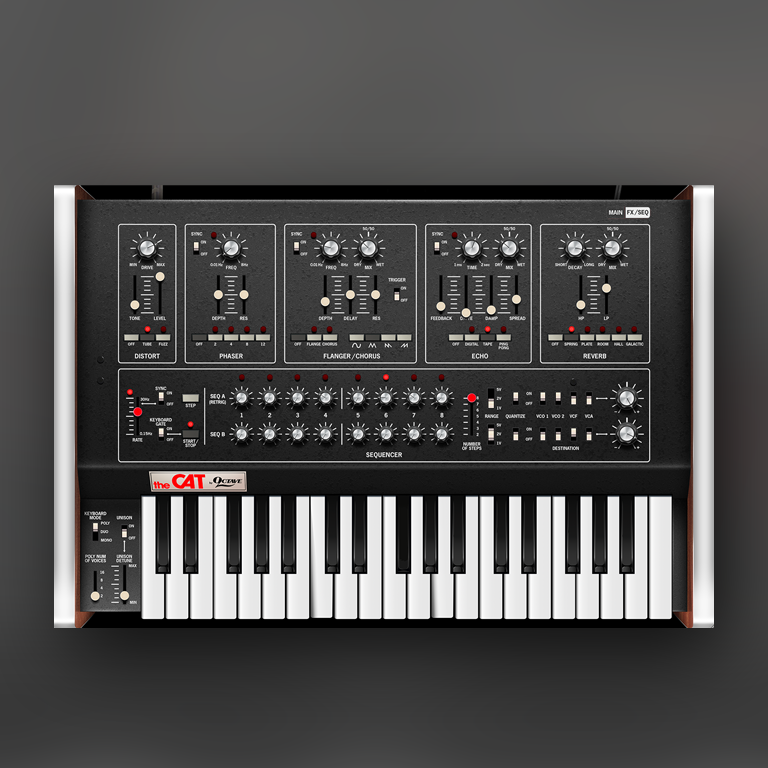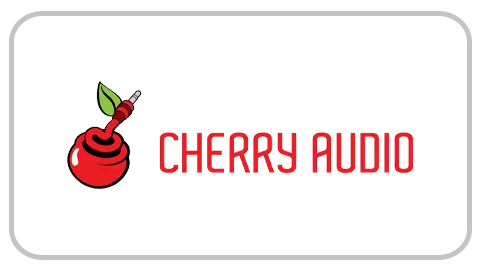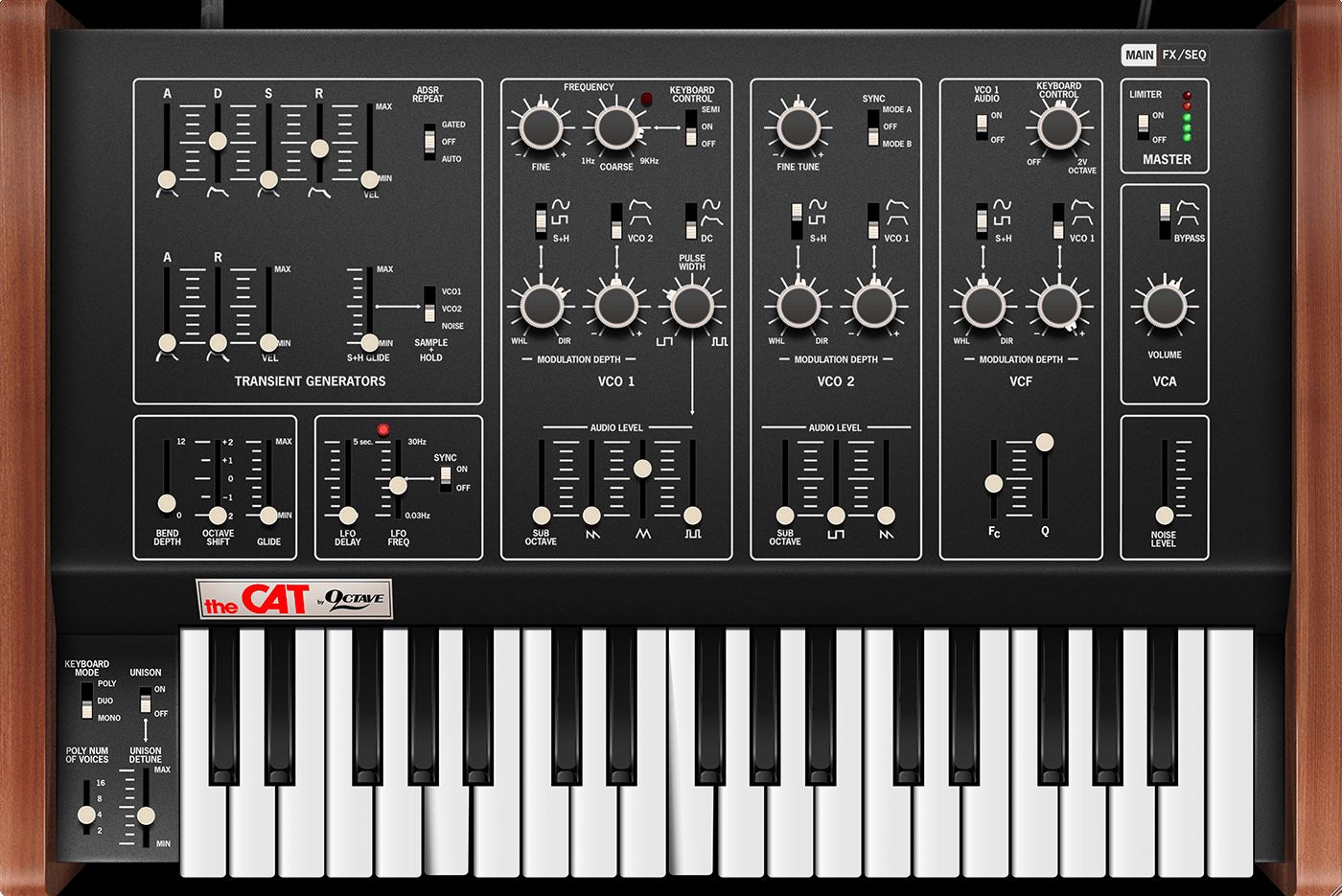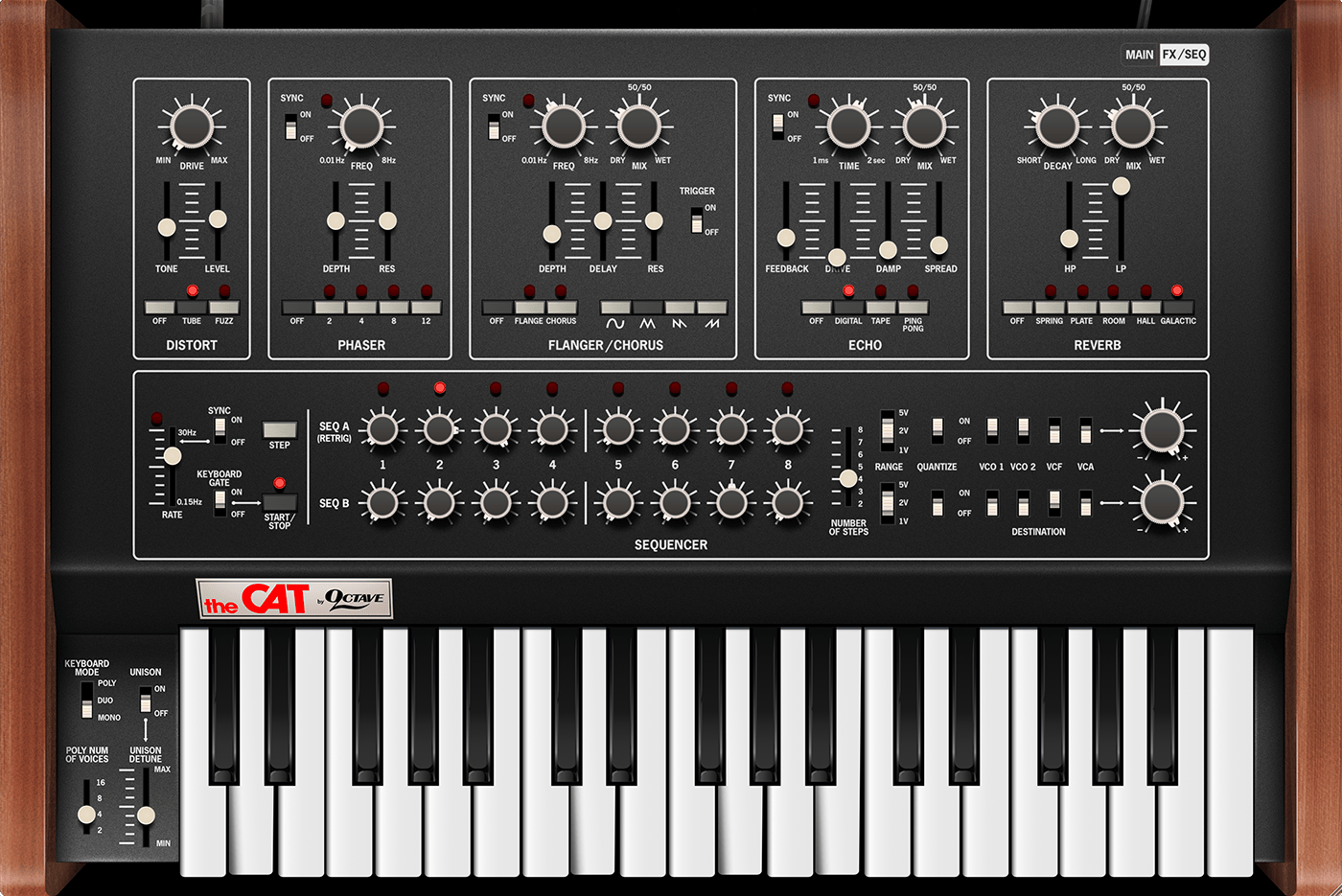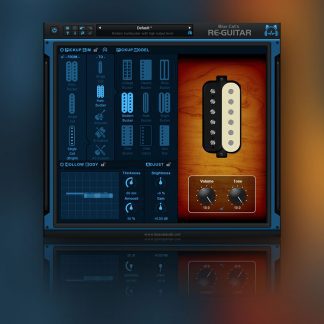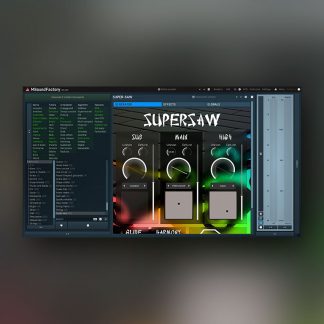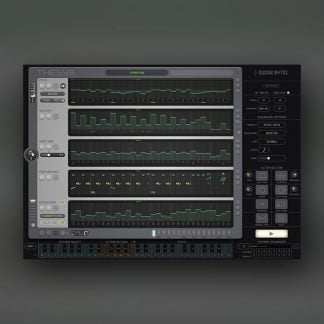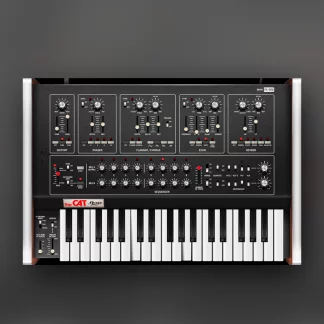A Ferocious New Breed
Cherry Audio’s Octave Cat synthesizer emulates The CAT duophonic synthesizer unleashed by Octave Electronics in 1976. Developed in partnership with The CAT’s original designer, Octave Cat retains all the growl of the original hardware’s fat, savage sound and replicates its aggressive resonant filter. Octave Cat features the flexible modulation, screaming audio-range oscillator cross-mod, and fierce oscillator sync of the original hardware, and extends it with expanded polyphony, a robust integrated effects suite, and a versatile dual-step sequencer.
A free 30-day demo of Octave Cat is available. This demo will play white noise periodically, but is otherwise unlimited.

1976: The Year of The CAT
In the early 1970s, portable synthesizers were a rarity, and only a select few musicians could afford the legendary Minimoog or ARP Odyssey synthesizers. Recognizing this, a small group of engineers in New York led by the brilliant 22-year-old Carmine Bonanno decided to shake things up and create affordable synthesizers with innovative features, giving birth to Octave Electronics, which later became Octave-Plateau™.
Drawing from his own designs for a modular system, Bonanno and his team set out to create a synthesizer that was not only accessible to up-and-coming musicians but also boasted groundbreaking features. The result was The CAT synthesizer — an elegant and easy-to-program monophonic/duophonic synthesizer that offered an innovative combination of features including cross-mod, configurable sample and hold, extensive modulation, dual sub-oscillators, combinable waveforms, two types of oscillator sync, and a lowpass filter with uniquely powerful resonance.
Even more revolutionary was the 1976 introduction price of only $599 – a game-changer for musicians who couldn’t afford more expensive alternatives. It also caught the attention of more affluent musicians, who praised its exceptional performance and versatility. Some of the biggest names in electronic music have used The CAT, including Devo, Orchestral Manoeuvres in the Dark, Dave Greenslade, Split Enz (notably for the keyboard break in their hit track, “I Got You”), and, more recently, The Prodigy and The Chemical Brothers.
The CAT synthesizer remains an iconic piece of music technology, representative of Octave’s legacy of groundbreaking innovation and a relentless drive to make audio and music technology accessible to all.
Octave Cat: A Curious Collaboration
To preserve the legacy of this iconic synthesizer and provide today’s music producers with an ideal tool for production, Cherry Audio has added another life to The CAT with the introduction of Octave Cat. Cherry Audio Octave Cat expands upon the original with up to 16-voice polyphony, and adds a feature-packed “page two” with distortion, phaser, flanger/chorus, echo, and reverb effects, as well as a super-flexible dual eight-step sequencer capable of modulating numerous parameters.
Cherry Audio was thrilled to collaborate on Octave Cat with original designer and Octave Electronics founder, Carmine Bonanno. Expressing deep admiration for the outcome of this collaboration, Carmine notes that Octave Cat feels and sounds just like the real instrument. “Better yet,” he adds, “it goes way beyond what a hardware CAT is capable of. For instance, on a hardware CAT, you can’t save a patch, you can’t control modulation with an external MIDI controller, you don’t have full polyphony, etc.”
In addition to capturing the unique sonic character of the original, Cherry Audio added enhancements like sample and hold glide, step-sequencing, MIDI clock sync, a suite of effects, and more. “All of this,” says Bonanno, “makes the Cherry Cat incredibly more versatile than a hardware CAT.”
Cherry Audio spared no effort to ensure that the Octave Cat was crafted with the utmost respect and attention to the original instrument’s signature features. The result is a beautiful and fully realized piece of music technology that will undoubtedly find its way into the hands of countless music producers in the years to come. With Cherry Audio’s commitment to excellence and reverence for the original, the Octave Cat stands as a testament to the possibilities that arise when innovation meets tradition!

Octave Cat Features
- All aspects of the original CAT precisely modeled in exacting detail
- Over 300 presets
- Dual Panel Views with an authentic Main view for synthesis controls, and an additional FX/Seq panel with extended features
- Monophonic, duophonic, and polyphonic (up to 16 voices) voice modes
- Unison for mono and duo modes
- Two distinct VCOs with discrete wave, modulation, S+H, and sub octave settings; VCO1 with saw, triangle, and pulse with PWM, and VCO2 with square and saw waveforms
- Vintage-correct four-pole 24 db/oct filter, based on the original “cascaded OTA” SSM2040 filter with precise replication of The CAT’s unique resonance
- Accurate reproduction of the original’s Transient Generators section with two envelope generators: a standard ADSR (attack/decay/sustain/release), and an AR (attack/release)
- Sample and Hold with VCO1, VCO2, or Noise as source, with Glide that slews the voltage steps for smoother transitions
- User-selectable Bend Depth, Octave Shift, and note Glide
- Tempo-syncable LFO with onset delay
- White noise generator
- Classic-style dual-channel, eight-step sequencer, independently assignable to oscillator pitches, filter cutoff frequency and VCA amplitude, with tempo sync, quantization, and keyboard transpose
- Studio-quality integrated effects: distortion with tube and fuzz, 2/4/8/12-stage phaser, flanger/chorus, three syncable delay types, and five reverb types
- Selectable original “Mark I” or later-style “SRM” skin
- Standalone virtual instrument and plug-in versions included
- Channel pressure and polyphonic aftertouch as a polyphonic modulation source
- Support for MIDI Polyphonic Expression (MPE) — Pitch, Channel Pressure, and Timbre — making Octave Cat capable of more organic and expressive performances when using MPE-compatible controllers
- Complete MIDI control and DAW automation for all controls, with easy-to-use MIDI learn and mapping
- Cherry Audio’s popular Focus zoom-in feature, as well as standard UI zoom and resize via drag
- Complete documentation available directly online from the instrument or in downloadable PDF format
- User-adjustable oversampling control

